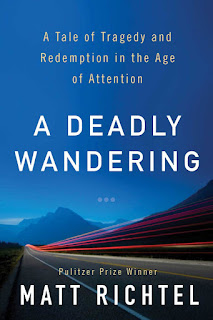A brilliant, narrative-driven exploration of technology’s vast influence on the human mind and society, dramatically-told through the lens of a tragic “texting-while-driving” car crash that claimed the lives of two rocket scientists in 2006.
In this ambitious, compelling, and beautifully written book, Matt Richtel, a Pulitzer Prize-winning reporter for the New York Times, examines the impact of technology on our lives through the story of Utah college student Reggie Shaw, who killed two scientists while texting and driving. Richtel follows Reggie through the tragedy, the police investigation, his prosecution, and ultimately, his redemption.
In the wake of his experience, Reggie has become a leading advocate against “distracted driving.” Richtel interweaves Reggie’s story with cutting-edge scientific findings regarding human attention and the impact of technology on our brains, proposing solid, practical, and actionable solutions to help manage this crisis individually and as a society.
A propulsive read filled with fascinating, accessible detail, riveting narrative tension, and emotional depth, A Deadly Wandering explores one of the biggest questions of our time—what is all of our technology doing to us?—and provides unsettling and important answers and information we all need.
403 pages (September 2014)
Check availability
Book Page at BookBrowse.
Lit Guide from LitLovers.
To find a discussion guide for this book in the NoveList Plus database, go to the Library's website, click on Novelist under "We Recommend" → "Book Services". Click on "Book Discussion Guides" in the right sidebar on NoveList's
home page. Then, either enter the title in the Search box or search for
the title alphabetically. (You will need your Salt Lake County Library
card number to access this resource outside a county library.)
Book Trailer:
This title is available for download as an eAudioBook. Learn more about downloadables from the library here.
Title Read-alikes: Alone Together by Sherry Turkle; More Awesome Than Money by Jim Dwyer; The Organized Mind by Daniel J. Levitin; Now You See It by Cathy N. Davidson; The Shallows by Nicholas Carr; Everybody Lies by Seth Stephens-Davidowitz; Life in Code by Ellen Ullman; The Second Machine Age by Erik Brynjolfsson; Abundance by Peter H. Diamandis; The Four by Scott Galloway; The Future of the Internet and How to Stop It by Jonathan Zittrain; and Pilgrim's Wilderness by Tom Kizzia.

No comments:
Post a Comment